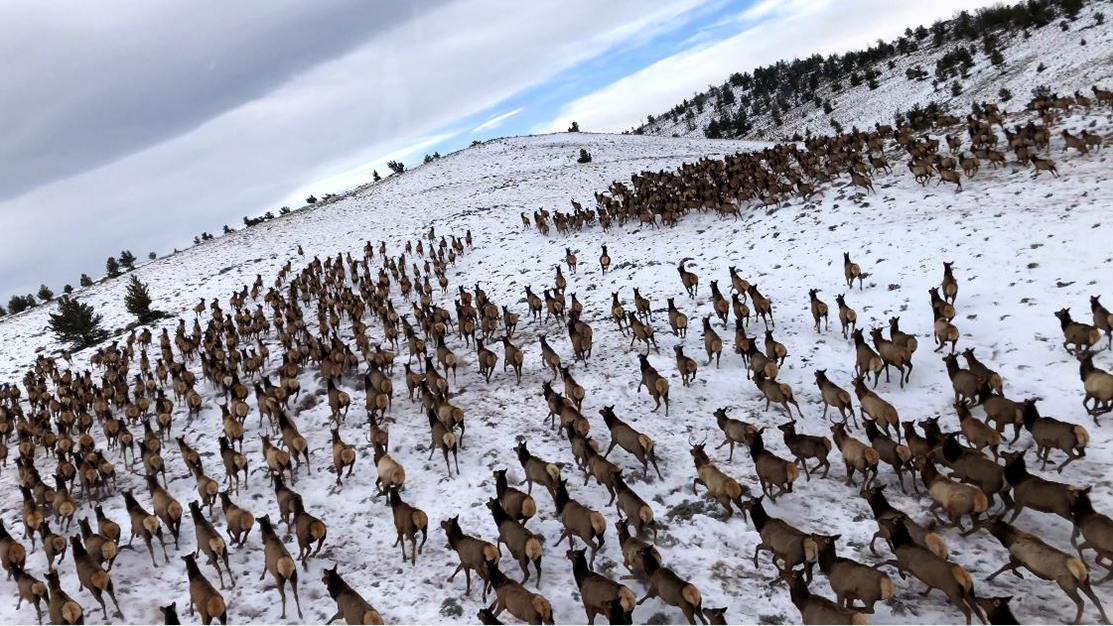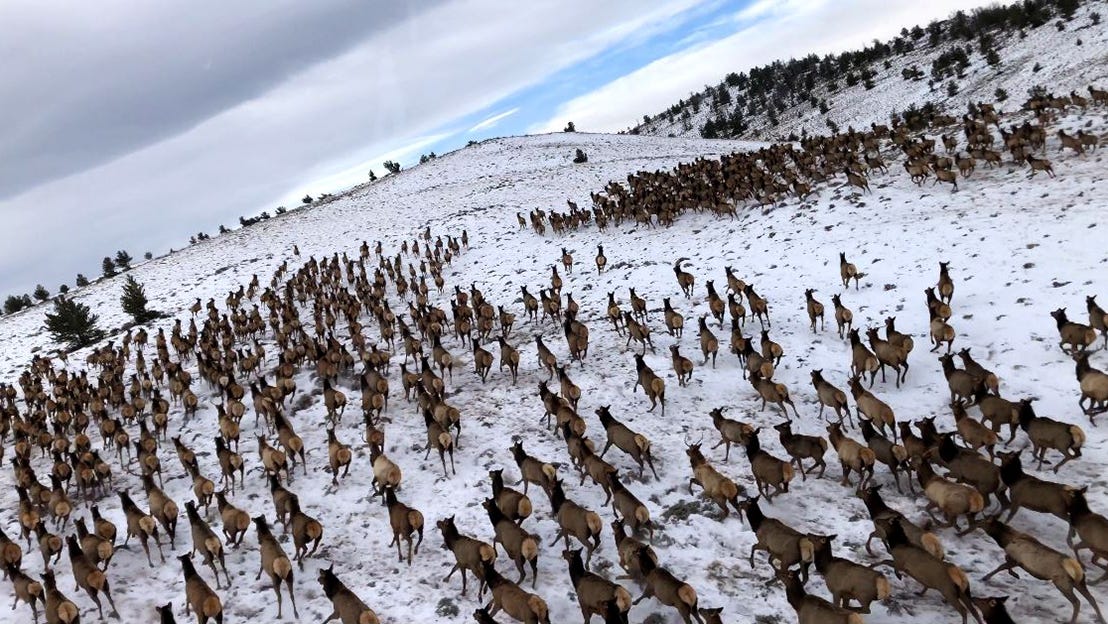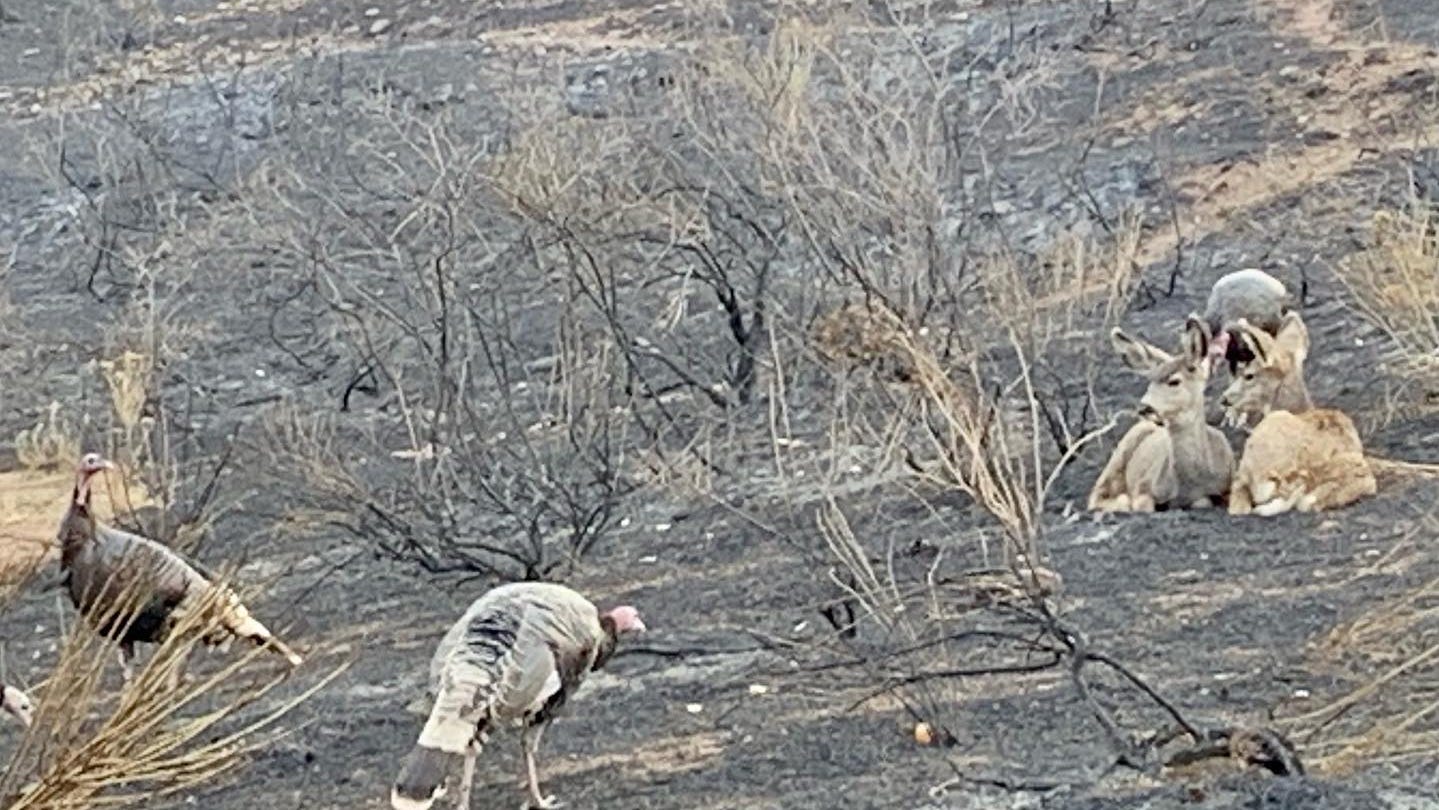Thank you for posting that video !! I have flown waterfowl surveys with some talented pilots in fixed wing aircraft. That helicopter pilot in the video is GOOD !! The biologist seems to really like her work. Good to see.
Video shows 4,200 elk in area of Cameron Peak Fire, the largest wildfire in Colorado history
The Cameron Peak Fire burned 208,913 acres from Aug. to Dec. in Larimer County, but it does not appear that the fire is impacting elk herds.kdvr.com
Cool video of them surveying the elk a few months after.
Navigation
Install the app
How to install the app on iOS
Follow along with the video below to see how to install our site as a web app on your home screen.
Note: This feature may not be available in some browsers.
More options
You are using an out of date browser. It may not display this or other websites correctly.
You should upgrade or use an alternative browser.
You should upgrade or use an alternative browser.
How Fires Affect The Hunt
- Thread starter Sytes
- Start date
We'll see the outcome now when I go down to gather firewood this year and scout for deer possibilities . Tons of downed wood along the roads with little to no snow after recent burn. Area was one with good numbers of deer in a sea of elk.
Elk numbers never dropped really here that I can tell, while they increased in my area after the big fires a few years ago and they never dropped.
Elk numbers never dropped really here that I can tell, while they increased in my area after the big fires a few years ago and they never dropped.
Smokeydabear
New member
- Joined
- Nov 14, 2020
- Messages
- 8
I really am interested in all the comments here i love fire science and how it affects the environment.What's your experience with fires and your hunt? Interested in wildland firefighter, biologist, and hunter experience. I have limited experience hunting areas in relative proximity of a forest fire though not sure I was really focused on the habits of wildlife vs assuring my own safety, etc.
At what distance from a fire does wildlife move?
How far from a fire do they settle?
Does it reduce, or increase, (or no difference) ungulate alert level to human / predator threat?
How does smoke effect their ability to catch scent, or does it have any effect?
Do ungulates gravitate towards more specific geographic locations? i.e. coolies/ravines? high elevation? Thick or sparse treed area, etc?
Does their feed / sleep time modify or remain?
Any other interesting thoughts about big game / predators worth noting for hunters?
Is there a difference for those questions based on the animal - elk, deer, bear, wolf?
Yes - hunters need to check for fire restrictions. Agree hunters need to be very aware of fire use even when restrictions are not present. Advised to contact the ranger station that covers the area of the hunt for most updated info on fires, etc... I'm interested in the wildlife activity during a fire. The ethics, brain power of the hunter is an entirely different topic.
Thanks all.
edit added: changed title "Effect" to "Affect". verbiage use. haha!
SaskHunter
Well-known member
Bear and coyotes will be back in days to feast on slow animal carcasses.
Sometimes the stumps are still soldering.
Getting a taste of BBQ, they're evolving!
LuketheDog
Well-known member
So cool, hard to imagine they count them that way. You would think with video technology these days there would be something to help them out a bit.
Right? Seems like even just taking a bunch of still photos of a group and counting them later would be more accurate or easier...
Panda Bear
Well-known member
- Joined
- Apr 23, 2019
- Messages
- 845
I think every question in that list has so many variables that they are unanswerable. In short, it depends...I don’t think there are one-size-fits-all answers to any of those.
What species, and what are it’s needs? How big is the fire? What resources are left and available to them vs what was destroyed? Weather? Timing? Terrain? Fire behavior and intensity? Areas with active attack and lots of activity vs remote areas left alone to burn?
I’ve seen animals back in the black within 24 hours in places, some places where they simply ran around the flames and never left, and places so moonscaped I didn’t see anything for months. If the surrounding area is rich in resources they might not go far at all. If not, they’ll go until they find what they need. Their response to scent and predators will probably depend on how much disturbance they were subjected to, weather, how secure they feel where they are, etc.
I think as a hunter, you need to consider the specifics of that particular fire, how that fits in with the specifics of that landscape, and then think about how those together might influence your species of interest in that particular location. Will vary fire to fire, and probably from place to place within the same fire.
Exactly. So many variables
Fish are a yes and no depending on the breed, but in almost all cases the damage is short lived
Birds are also a yes and no and more determined by the time of year, especially for migrating species. i.e.: different breed's of Grouse react differently to the condition of the Boreal
Mammals, again yes and no. Wolverines, Grizzly, Caribou, Marten, others, --decrease
Cougars, Wolf, Squirrels, Beaver, black bears, deer, moose, others, --increase The moose population is possibly the main reason for the decrease in Caribou numbers, in new growth areas
wildfires and the smoke have a detrimental effect on Indigenous communities in The Territories. In addition to the direct effect of fire, smoke and displacement, the loss of wildlife affects livelihoods and food source
In the wider view of the land, the fires can add Calcium, Phosphiras, potassium, sun light, etc. Erosion is a major negative, both to land and streams after the fire
Vacation... final hour in the swaying hammock and reading articles such as this before driving to the airport :

The latter half dives into the effects of burn areas and elk as it relates towards future Intel gathering. It should reveal some quality information in the years to come.
Worth the read none the less.
Within the article the link below is shared and this goes directly towards the thread interest...


Harrowing helicopter ride offers glimpse of Cameron Peak Fire's impact on elk herd
Colorado Parks and Wildlife using collared elk to study the effects the largest wildfire in state history has on the herd northwest of Fort Collins.
amp.coloradoan.com
The latter half dives into the effects of burn areas and elk as it relates towards future Intel gathering. It should reveal some quality information in the years to come.
Worth the read none the less.
Within the article the link below is shared and this goes directly towards the thread interest...

Stories from biologist, Cameron Peak Fire survivor show how wildlife reacted during wildfire
Collared elk in burn area not only survived the largest wildfire in state history but found life in it.
www.coloradoan.com
Similar threads
- Replies
- 17
- Views
- 2K
- Replies
- 20
- Views
- 2K




